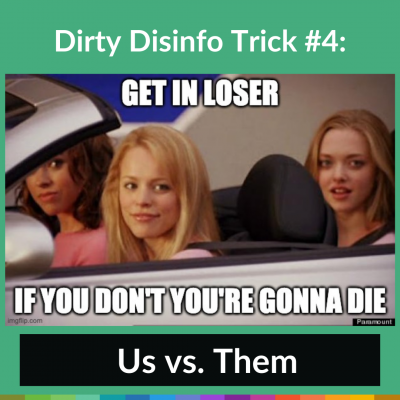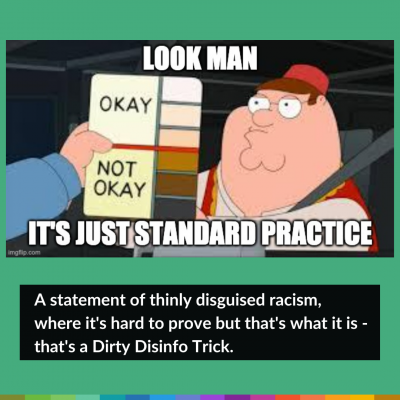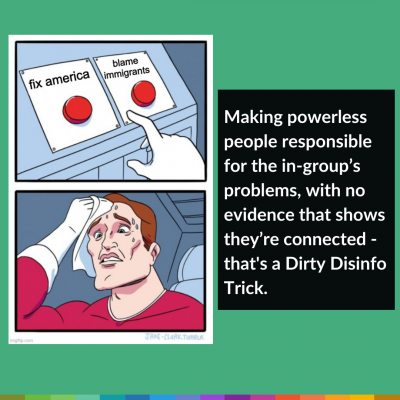Us vs. Them





- Reality Team
- March 12, 2021
If you’ve noticed how often issues become “you’re either with us or against us” – you’ve noticed this DDT. Like nearly all Dirty Disinfo Tricks, Us Vs. Them is a way to distract us from the point, or to disguise a blatant lie.
And once we can see it – it loses its power.
What is “us vs. them?”
This is a disinfo trick where someone weaponizes our need to feel part of a group, to make us accept what they’re saying. They create an outgroup or puff up “our” group as a way to make us feel good – which saves them from having to engage with complexity.
It’s a technique that can be used to serve positive or negative goals – for example, it was used during World War II to unite the American people in the war effort.
It’s everywhere, and it’s very easy to fall for – simply because we don’t recognize it as a trick. But it is, and it’s deliberate. Here’s how to avoid getting duped.
How it’s used:
Bandwagon:
If someone says a bunch of people are doing/ saying a thing and that’s why you should do it too – that’s bandwagoning. “All the real progressives have their gender pronouns in their Twitter bio.”
Dogwhistle:
A dogwhistle is a statement of thinly disguised racism. It’s hard to prove it’s a racist statement – but everyone knows it is. “Low income housing will destroy your suburban dream – so I pledge to keep it out of your neighborhood!”
Scapegoat:
Making powerless people responsible for the in-group’s problems, with no evidence that shows they’re connected (or even true). “Healthcare is unaffordable because immigrants get free care at the ER.”
Sacred cows:
This one shows up a LOT. It’s when someone brings up law enforcement, religion, the military or some other institution we’re not supposed to critique, as a way to shut down the discussion. “Your question about my foreign policy disrespects the men and women who fought and died for this country.”
Why is “us vs. them” so effective?
As far as our brains are concerned, being part of a group keeps us safe. It matters more than what’s true. So when our brain thinks it sees something that will help us fit in, it almost always accepts what it sees – whether or not it’s a lie.
This trick works, but not because we’re dumb – because we see belonging as a question of life or death.
What to look for:
If you feel like they’re talking about who you are, instead of an issue that affects you – they’re avoiding something they don’t want to talk about by flattering you. Don’t let them get away with it.
If you find yourself thinking, “Yeah, those damn [x]s are ruining everything,” that’s another big red flag. This person is trying to manipulate you into loyalty by claiming you have a common “enemy.” Don’t fall for it.
Finally, if someone brings up the police, “our brave men and women in uniform,” healthcare workers, or some other “hero” trope in the middle of a discussion about something else, be wary. Those concepts are frequently used as shields.
References
See an error in our work? Please let us know and include the source of your info. We’ll update or correct as appropriate.
